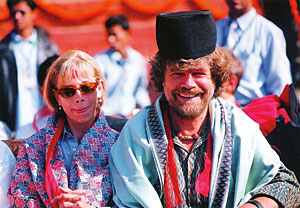 |
An epochal mountaineering feat was achieved by the Italian Reinhold Messner in 1978, when together with Peter Haebler of Austria, he climbed Mount Everest without supplemental oxygen. Although the debate about the potentially detrimental health impact of such climbs on the brain rages on, it is clear that their stellar accomplishment earned them a special place in the annals of climbing.
Messner continued to break records by becoming the first person to successfully make the first solo ascent of Mount Everest without a support team, an established camp, or prepared caches in 1980. On 16 August, as his friend Nena Holguin waited for him at the base of the North Col on the Tibetan side, he started out on his climb wearing jogging shoes, and reached the Col. At 5am on 17 August, he set off on his epic climb from the foot of the Col. He fell into a crevasse but extricated himself and slept in a small bivouac tent that night; he then staggered on, battling snowfall and poor visibility to finally reach the peak the next day.
Messner accomplished in three days what had taken many other climbers several weeks. By this time in Messner's career, he had climbed five 8000m peaks without oxygen. He ultimately became the first person to climb all 14 of the 8000m peaks.
What makes it physiologically possible for elite climbers like Messner to accomplish these difficult climbs? Is it just drive and ambition or are there important physiological factors? To answer this question, Dr Oscar Olez, Messner's personal physician from Switzerland, carried out extensive examinations on six elite altitude climbers. Much to his surprise, he found that these climbers had nothing unusual in their physical make-up. In fact exercise testing parameters revealed that these climbers' performances were far below those of world-class long-distance runners.
John West, the famous physiologist, likes to say that this 'unremarkableness' is reminiscent of the curious incident of the dog in the night-time in Sherlock Holmes' 'Silver Blaze'. When Holmes draws Watson's attention to "the curious incident of the dog in the night-time", Watson replies, "The dog did nothing in the night-time." Holmes then says, "That was the curious incident."


